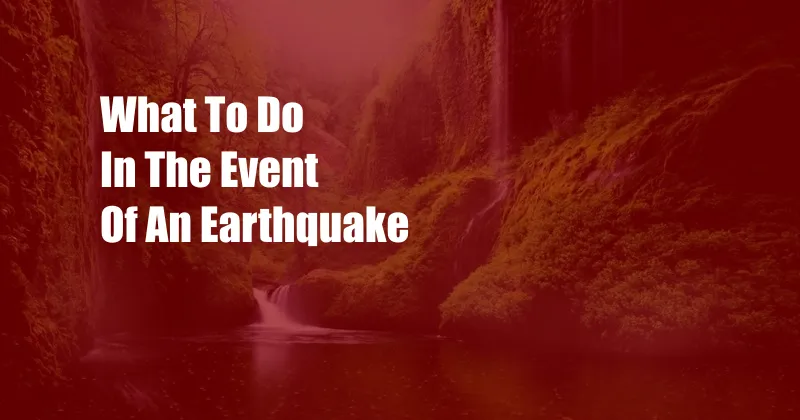
What to Do in the Event of an Earthquake
Remember my first earthquake here? It was a Friday night, and a group of us were sitting around a campfire, telling ghost stories. Suddenly, the ground began to shake and the fire pit started to crumble. We all screamed and ran, but it was too late. The earthquake had already hit.
We were lucky that night. The earthquake was only a 5.0, and no one was seriously injured. But it could have been much worse. If we had been inside a building, we could have been crushed by falling debris. If we had been near the beach, we could have been swept away by a tsunami.
Earthquakes: An Introduction
An earthquake is a sudden, rapid shaking of the earth’s crust. It is caused by the release of energy below the earth’s surface. Earthquakes can range in size from barely noticeable tremors to violent shocks that can cause widespread destruction.
Earthquakes can occur anywhere on Earth, but they are most common in areas where tectonic plates are colliding or moving past each other. The Pacific Ring of Fire is a horseshoe-shaped region around the Pacific Ocean that is particularly prone to earthquakes.
Causes of Earthquakes
Earthquakes are caused by the sudden release of energy below the earth’s surface. This energy can be released by:
- The movement of tectonic plates
- Volcanic activity
- Landslides
- Nuclear explosions
The most common cause of earthquakes is the movement of tectonic plates. Tectonic plates are large pieces of the earth’s crust that are constantly moving. When two tectonic plates collide, one plate may be forced to slide beneath the other. This process, called subduction, can cause earthquakes.
Effects of Earthquakes
Earthquakes can have a devastating impact on human populations. The effects of an earthquake can include:
- Ground shaking
- Surface rupture
- Liquefaction
- Tsunamis
- Landslides
Ground shaking is the most common effect of an earthquake. It can cause buildings to collapse, bridges to fall, and roads to buckle. Surface rupture occurs when the earth’s surface breaks along a fault line. Liquefaction is a process in which the ground turns to liquid, causing buildings and other structures to sink. Tsunamis are giant waves that can be generated by earthquakes. Landslides are also common after earthquakes.
Preparing for Earthquakes
There are a number of things you can do to prepare for an earthquake. These include:
- Making an emergency plan
- Building an emergency kit
- Securing your home
- Educating yourself about earthquakes
An emergency plan is a written plan that outlines what you will do in the event of an earthquake. It should include information on where you will go, how you will contact family members, and what you will do if you are separated from your family.
An emergency kit is a collection of supplies that you will need in the event of an earthquake. It should include food, water, first aid supplies, and a battery-powered radio.
Securing your home is important to prevent damage during an earthquake. This includes securing heavy objects, such as bookcases and appliances, and reinforcing windows and doors.
Educating yourself about earthquakes is also important. This will help you to understand the risks and to be prepared for an earthquake.
What to Do During an Earthquake
If you are indoors during an earthquake, the safest place to be is under a sturdy table or desk. Stay away from windows, outside doors, and chimneys. If you are outdoors, stay away from buildings, trees, and power lines.
If you are in a car during an earthquake, pull over to the side of the road and stop. Stay in your car and wait for the shaking to stop.
What to Do After an Earthquake
After an earthquake, there are a number of things you should do to ensure your safety and well-being. These include:
- Check for injuries
- Inspect your home for damage
- Turn off gas, water, and electricity
- Contact family members
- Be prepared for aftershocks
If you are injured, seek medical attention immediately. If your home is damaged, inspect it carefully for structural damage. Do not enter your home if it is damaged. Turn off gas, water, and electricity to prevent further damage. Contact family members to let them know you are safe. Be prepared for aftershocks, which can occur after an earthquake.
FAQs
Q: What is the difference between an earthquake and a tremor?
A: An earthquake is a sudden, rapid shaking of the earth’s crust. A tremor is a small earthquake that is often not felt by humans.
Q: What is the Richter scale?
A: The Richter scale is a measure of the strength of an earthquake. It is based on the amplitude of the seismic waves recorded by seismographs.
Q: What is the difference between an epicenter and a hypocenter?
A: The epicenter is the point on the earth’s surface directly above the hypocenter. The hypocenter is the point below the earth’s surface where the earthquake occurs.
Q: What is the best way to prepare for an earthquake?
A: The best way to prepare for an earthquake is to make an emergency plan, build an emergency kit, secure your home, and educate yourself about earthquakes.
Conclusion
Earthquakes are a natural hazard that can cause widespread damage and loss of life. However, by being prepared, you can reduce your risk of injury or death in the event of an earthquake.
Are you interested in learning more about earthquakes? If so, I encourage you to visit the following websites:
- United States Geological Survey (USGS)
- National Earthquake Information Center (NEIC)
- Federal Emergency Management Agency (FEMA)